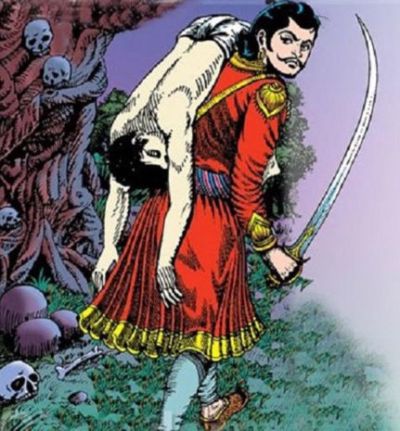Manaḥsvāmin was paid for his services, and so he wasn’t considered the father.
The thief, on the other hand, gave his entire wealth to his wife, and thus owned the kshetra, as he paid for her and the child’s maintenance.
The king was also not the true father. While he brought the child up and educated him, he too accepted the gold that had been offered and so only acted as a caretaker, and not the owner of the kshetra. If however, he had not accepted the money, the king may have been considered and the true father.

विम्शो वेताल:
The twentieth story
The boy who offered himself to save the king’s life
ततो गत्वा गृहीत्वांसे वेतालं शिंशपातरोः ।
स त्रिविक्रमसेनस् तम् उच्चचाल पुनर् नृपः ॥ १२,२७.१ ॥
मौनेन प्रस्थितं तं च वेतालो ऽंसाद् उवाच सः ।
राजन् कस् ते ऽनुबन्धो ऽयं गच्छ रात्रिसुखं भज ॥ १२,२७.२ ॥
न युक्तं तव नेतुं मां कुभिक्षोस् तस्य गोचरम् ।
ग्रहो वा तत्र चेद् अस्तु कथाम् एकाम् इमां शृणु ॥ १२,२७.३ ॥
King Vikram went back to the tree, and bringing down the Vetāla, placed him across his shoulders and started to walk back.
As the king walked in silence, the Vetāla spoke from his shoulder.
“Oh king! Why are you so persistent? You should rest tonight – you have done enough. It is not befitting of you to carry me back to that tāntrik.”
“However, if you are bent upon completing this task of ours, then listen to this story…”
अस्ति स्वरेखानुत्क्रान्तवर्णभेदव्यवस्थिति ।
नगरं चित्रकूटाख्यं बिभ्राणं सत्यनामताम् ॥ १२,२७.४ ॥
तत्रामृतरसासारवर्षी प्रणयिचक्षुषाम् ।
चन्द्रावलोक इत्य् आसीद् राजा राजशिखामणिः ॥ १२,२७.५ ॥
आलानं शौर्यकरिणस् त्यागस्योत्पत्तिकेतनम् ।
विलासवेश्म रूपस्य शशंसुर् यं विचक्षणाः ॥ १२,२७.६ ॥
सतीषु सर्वसंपत्सु यन् न प्राप निजोचिताम् ।
भार्यां सैका परं चिन्ता यूनस् तस्याभवद् धृदि ॥ १२,२७.७ ॥
There is a city in the north of Bhāratvarshā, and it’s name is Citrakūṭa.
In the city lived a king, who was named Candrāvaloka, and he was called the king of kings.
Wise men praised him as the towering elephant of valor, the fountainhead of generosity and the pinnacle of handsomeness.
He had everything, but there was one thing that eluded him. Although he was very prosperous, he was unable to find a wife who was suitable for him.
एकदा च तदुद्वेगविनोदाय महाटवीम् ।
जगामाश्वीयसहितो मृगयायै स भूपतिः ॥ १२,२७.८ ॥
तत्र सूकरवृन्दानि भिन्दन् बाणैर् निरन्तरैः ।
श्यामलाम्बररोचिष्णुस् तमांसीव रविः करैः ॥ १२,२७.९ ॥
शाययञ् शरशय्यासु सिंहान् समरदुर्मदान् ।
मूर्धजैर् धवलैर् भीष्मान् अर्जुनाधिकविक्रमः ॥ १२,२७.१० ॥
विपक्षीकृत्य शरभान् पातयन् पर्वतोपमान् ।
दम्भोलिकर्कशप्रासपातैर् जम्भारिविक्रमः ॥ १२,२७.११ ॥
रसाद् विविक्षुः स नृपो वनाभ्यन्तरम् एककः ।
तीव्रपार्ष्णिप्रहारेण प्रेरयामास वाजिनम् ॥ १२,२७.१२ ॥
स वाजी तेन च कशाघातेनोत्तेजितो भृशम् ।
पार्ष्णिघातेन विषमं समं चागणयन् क्षणात् ॥ १२,२७.१३ ॥
वनान्तरं ततो ऽनैषीद् वाताधिकजवो नृपम् ।
मोहितेन्द्रियवृत्तिं तं व्यतीत्य दशयोजनीम् ॥ १२,२७.१४ ॥
One day, the king, accompanied by his attendants, went out into the forest to hunt.
And he hunted well, shooting down herds of wild boar, as the sun dispels the darkness with it’s shap rays.
Equally the mighty Arjuna in strength, he even made lions, who rose to challenge him, their manes flying in the winds like mighty flames, bite the dust and lay them on beds of arrows…
Like Indrā, he made mighty birds fall to the ground, by clipping their wings with his sharp vajra-like arrows…
In the heat of the chase, he kept spurring his horse to go faster and faster, and the horse, egged on by the strokes of the whip, didn’t care for the rough, or the smooth, but instead darted along like the wind, and in moments, covered a distance of ten yojanas, and carried the king, who was too excited to notice, deep into the forest.
to be continued…
